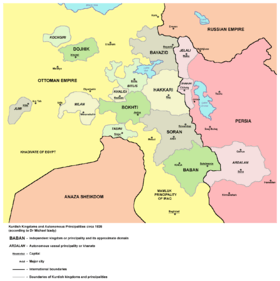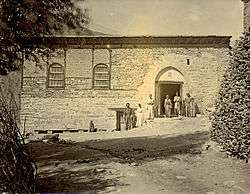Emirate of Hakkâri

The Emirate of Hakkâri (Kurdish: Hekarî) was a Kurdish Sunni Muslim emirate in present-day southeastern Turkey, centered on the city of Hakkâri, and to the West of Lake Urmiya on the border with Iran which ruled a wide variety of peoples.[1]
At the height of its power, the emirate controlled the Turkish provinces of Hakkari and Van, along with some areas in northern Iraq. The population was heterogeneous, with pastoral Kurdish tribes, Nestorian Assyrian Christians who were vassals of the Kurdish tribes, and settled Armenian farmers.[2]
The emirate lasted from the 15th century until 1835, when internal disputes resulted in it briefly coming under the patronage of the last Kurdish Emirate of Botan, led by Muhammed Bedir Khan. Eventually both were absorbed into the Ottoman Empire following the Tanzimat reforms which reorganised and centralised the state.[2]
In the 1820s, the Emirate of Hakkâri was consumed by a conflict between Nur Allah Beg and Suleiman Beg.[3] Nestorian Assyrian tribes took sides, with the patriarch Mar Shinum throwing his support behind Suleiman Beg. The influence of Western missionaries and their associated governments also unbalanced the religious equilibrium between Christian and Muslim tribes at a time when the Ottoman state was weakened by wars with Russia in 1828-29 and Egyptian ruler Muhammed Ali in 1831.[4]

Emir Nur Allah Beg of Hakkâri and Muhammed Bedir Khan massacred the Nestorian Assyrians within their lands in 1843 following the encouragement of the Ottoman authorities, who associated them with the growing influence of Western missionaries and of Britain and Russia. Subsequently, the Ottomans attempted to exert their authority over the Kurdish statelets, resulting in a confrontation between the Ottoman military and the Bedir Khan Kurdish coalition in 1847. The Kurdish tribes were defeated, and Bedir Khan sent into exile.[2]
References
- ↑ Bengio, Ofra (2014-11-15). Kurdish Awakening: Nation Building in a Fragmented Homeland. University of Texas Press. ISBN 9780292758131.
- 1 2 3 Eppel, Michael (2016-09-13). A People Without a State: The Kurds from the Rise of Islam to the Dawn of Nationalism. University of Texas Press. ISBN 9781477311073.
- ↑ nzibari (2012-04-16). "The downfall of Bedrkhan and the end of Botan". Kurdish Musings. Retrieved 2017-06-28.
- ↑ Bengio, Ofra (2014-11-15). Kurdish Awakening: Nation Building in a Fragmented Homeland. University of Texas Press. ISBN 9780292758131.